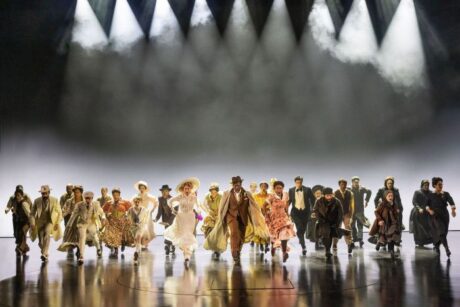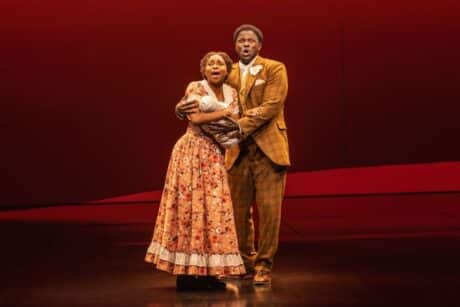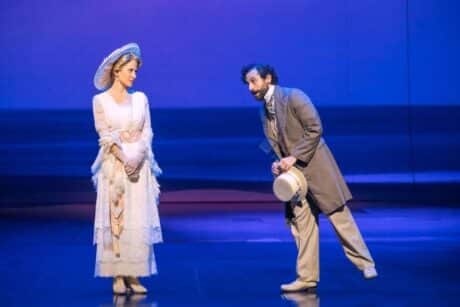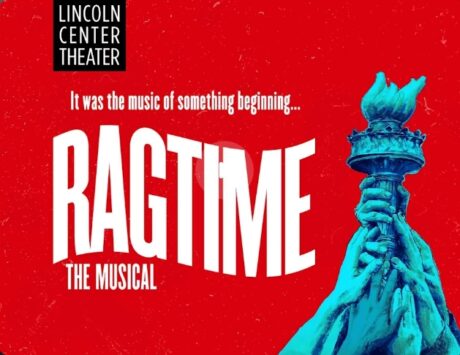Following its acclaimed 2024 concert staging with Encores! at New York City Center, the Broadway revival of the 1998 musical epic Ragtime, based on E.L. Doctorow’s 1975 novel of the same name, with a book by Terrence McNally and a Tony-winning score by Stephen Flaherty and Lynn Ahrens (music and lyrics), is now playing a limited engagement at the Vivian Beaumont Theater at Lincoln Center. Directed again by Lear DeBessonet (who previously served as artistic director for Encores! and, since July, for Lincoln Center Theater) and starring most of the leads and many featured members of the cast from the NYCC show, the turn-of-the-20th-century historical fiction weaves together the lives and struggles of three families of different social classes, religions, races and ethnicities, in a mostly sung-through operatic format that highlights the extraordinary vocals and dramatic intensity of the story and the characters’ pursuit of the American Dream. It’s a full-scale two-act production with 36 musical numbers, a large company of 34, and a 28-piece orchestra, conducted by music director James Moore, with original orchestrations by William David Brohn, that delivers the grandeur and magnitude of old Broadway and a theme of racism, anti-Semitism, and xenophobia that continues to resonate in our present divisive time.

Set in the first decade of the 1900s, the converging plotlines revolve around three distinct groups of people and neighborhoods in New York representing our American melting-pot culture: the upper-class white family, with conflicting attitudes and ideals of the Mother, Father, their Little Boy, his Grandfather, and Mother’s Younger Brother, living a prosperous life of privilege in suburban New Rochelle; Tateh, a poor Jewish immigrant from Latvia, who arrives with his Little Girl on a “rag ship” by way of the Statue of Liberty and struggles with assimilation as a street silhouette artist in the over-crowded and impoverished community of the Lower East Side; and famed Black ragtime pianist Coalhouse Walker, Jr. in Harlem, trying to reconnect with his love Sarah and the baby son he didn’t know they had (who were saved and taken in by the compassionate Mother) and to find justice in a society filled with racial tensions, hatred, and violence. Their lives intersect, in a rich and enthralling story filled with hope for a better life and the promise of a new and more accepting younger generation, in a country and a world on the brink of change.
An absolutely phenomenal cast, led by Joshua Henry as Walker, Caissie Levy as Mother, and Brandon Uranowitz as Tateh, embodies the multi-layered personalities, backgrounds, and profound challenges faced by the central protagonists with affecting depth, empathy, and emotion, both in their characterizations and their revealing songs (vocal arrangements by Flaherty) – three of which (“Back to Before” sung by Levy, “Wheels of a Dream” by Henry and Nichelle Lewis in the role of Sarah, and Henry’s eleventh-hour number “Make Them Hear You”) rightfully elicited extended mid-show standing ovations at the performance I attended (and I’m sure at many others). As with the leads, the featured actors embrace the individuals they portray and bring credibility to their situations, attitudes, and interactions: Colin Donnell as the Father, stuck in the dominant white male monied ways of his old genteel upbringing; Nick Barrington as Edgar, the couple’s observant, talkative, and prescient Little Boy, who repeatedly warns about the onslaught of WWI; Ben Levi Ross as Mother’s Younger Brother, a budding revolutionary increasingly dedicated to social reform and justice for Walker; Tom Nelis as Grandfather, a laughably old-time conservative; Tabitha Lawing as Tateh’s Little Girl, kept on a rope leash to ensure her safety; Jacob Keith Watson as Willie Conklin, chief of the New Rochelle volunteer fire department, who hurls racist epithets at Walker in a heavy Irish accent and tries to prevent him from entering their white neighborhood by destroying his car; and Kaleb Johnson and Kane Emmanuel Miller alternating in the role of the young Coalhouse Walker III, who, happily playing with the other two children, leaves us with a sense of optimism.

In addition to the fictional characters, the story includes such real-life figures of the era as anarchist and activist Emma Goldman (Shaina Taub), who inspires with her impassioned speeches; Civil Rights leader, educator, and author Booker T. Washington (John Clay III), who advocates for Black equality through education, advancement, and friendship across races, not violence to solve injustice, and intervenes in the climactic scene in the Morgan Library, taken over by Walker and his men; escape artist and illusionist Harry Houdini (Rodd Cyrus), born in Budapest to a Jewish family; scantily clad and flirtatious Vaudevillian chorus girl Evelyn Nesbit (Anna Grace Barlow); her husband Harry K. Thaw, one of the wealthiest men in America (played by the versatile Watson); architect Stanford White (Billy Cohen), Nesbit’s lover, shot and killed by Thaw, in what became known as “The Crime of the Century” in the media and in her song; Henry Ford (Jason Forbach), industrialist and founder of the Ford Motor Company, which manufactured the Model T owned and driven by Walker; US Navy officer and Arctic explorer Admiral Peary and financier and investment banker J.P. Morgan (both played by John Rapson); and biased judge and politician Charles S. Whitman (also portrayed by Cohen). All are brought to life with fitting demeanors, actions, and beliefs, as recorded in history, by a masterful supporting cast.
Rounding out the excellent ensemble are Nicholas Barrón, Lauren Blackman, Allison Blackwell, Briana Carlson-Goodman, Jordan Chin, Rheaume Crenshaw, Ellie Fishman, Ta’Nika Gibson, David Jennings, Marina Kondo, Morgan Marcell, Kent Overshown, Kayla Pecchioni, Deandre Sevon, and Alan Wiggins, representing the white, immigrant, and Black communities of New York to which the lead characters belong, performing small but significant roles that drive the plot, singing in perfect harmony, and dancing to culture-defining choreography (by Ellenore Scott) in vintage-style costumes (by Linda Cho), and hair and wigs (by Tom Watson), that capture the period and visually distinguish their identities and group heritage (lavish white garb for the wealthy whites, drab ragtag clothing for the immigrants, and vibrant patterned shades of brown for the Black ragtime community).

The stirring and sweeping production is performed on a bare stage with a sparse set (scenic design by David Korins), employing roll-in pieces of architecture and furnishings, and projections (by 59 Studio) that include views of Ellis Island and the American flag, to indicate the locales and events, to allow space for the full company, and to let us focus on the actors in the spotlight (lighting by Adam Honoré and Donald Holder) without distraction. And sound (by Kai Harada) adds reinforcement to the powerhouse vocals and aurally communicates the show’s devastating climax.
Lincoln Center Theater’s revival of Ragtime is Broadway at its very finest, a top-notch production of an American classic with stellar performances, direction, and human themes that touch, entertain, and remain relevant, in their clear connection between then and now. Don’t miss it – and be sure to bring tissues for its most heartrending and shocking scenes.
Running Time: Approximately two hours and 50 minutes, including an intermission.

Ragtime plays through Sunday, June 14, 2026, at Lincoln Center Theater, Vivian Beaumont Theater, 208 W 41st Street, NYC. For tickets (priced at $196-321, including fees), go online, or find discount tickets at TodayTix.



